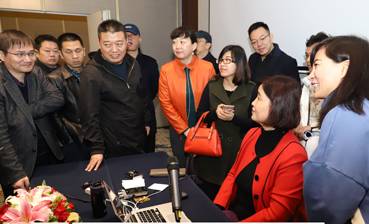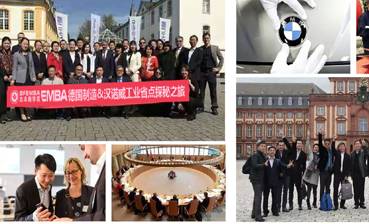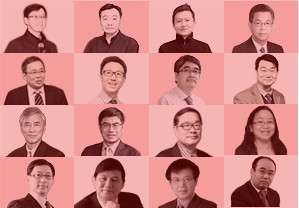北京师范大学经济与工商管理学院管理与组织心理学研究中心主任
中国社会心理学会管理心理学专业委员会理事
国家自然科学基金等机构的通讯评审专家
SSCI期刊Chinese Management Studies 副主编
Frontiers in Psychology 编委
中国管理案例共享中心评审专家
Human Resource Management Journal等SSCI期刊评审专家
钱婧,管理学博士,副教授。博士研究生导师。北京师范大学经济与工商管理学院管理与组织心理学研究中心主任,中国社会心理学会管理心理学专业委员会理事。主要研究领域为组织与管理心理学、脑认知与组织行为、商业创新与战略决策。在权威期刊Journal of Organizational Behavior、Human Resource management Journal等发表SSCI论文37篇。主持国家自然科学基金等6项基金项目。担任国家自然科学基金等机构的通讯评审专家。SSCI期刊Chinese Management Studies 副主编,Frontiers in Psychology 编委, Human Resource Management Journal等SSCI期刊评审专家,中国管理案例共享中心评审专家。美国管理学会年会(AOM)、澳大利亚与新西兰管理学会年会(ANZAM)、中国管理研究国际学会(IACMR)等国际学术组织评审专家。
带领团队长期关注本土企业发展,目前就高德、方太、博赛矿业、氪空间、猎豹移动、住范儿等企业开发的案例发表于《中欧商业评论》,《清华管理评论》,《海航云端》等主流商业杂志及案例库。所著案例入选哈佛案例库、全国百优案例,多次荣获中国工商管理案例中心 “卓越开发者”案例大奖,并获得“阿里活水学者”、“腾讯2020年度最受欢迎杰出教授”等荣誉。
人物经历
2016.9- 北京师范大学组织与管理心理学研究中心 主任
2015.9- 北京师范大学经济与工商管理学院 副教授
2015.8.1-2015.10.31 国家留学基金委选派,高等教育教学法出国研修项目(管理学专业一线教师),加拿大阿尔伯塔大学(选派类别:访问学者)
2012.10-2015.8 北京师范大学经济与工商管理学院 讲师。
研究方向
积极心理与行为
脑认知与组织行为
组织中的正念
商业创新与战略决策
共益及企业社会责任CSR
老年人力资源
自闭症康复机构管理
主讲课程
应用心理学
人力资源管理
组织行为学
管理学
心理测量
主要研究项目
2017-2020年:主持国家自然科学基金面上项目“反馈寻求行为对工作结果的影响:基于神经生理学视角的研究“。
2014-2016年:主持国家自然科学基金青年项目“中层领导寻求反馈行为的发展及其影响:一项追踪研究”。
2019-2021年:主持北京师范大学经济与工商管理学院拔尖人才支持计划。
2019年:主持人的发展经济学研究中心基金项目“老年人力资源的价值与赋能——基于发展心理学视角的研究”。
2014-2015年:主持教育部留学回国人员科研启动基金项目“导师制对员工焦虑症状的影响”(第47批:教外司留[2013]1792号)。
2014-2015年:主持北京师范大学自主科研基金项目“导师制对员工压力的影响:基于权变视角的实证研究”。
2012-2014年:主持北京师范大学经济与工商管理学院青年教师前期资助项目“导师制效果的非线性研究”。
2016-2018年:参与国家自然科学基金青年项目“探索儿童情绪调节在家庭因素影响焦虑症状过程中的中介效应”(第一参与人)。
2014-2015年:参与北京市自然科学基金青年项目“家庭累计危机对初显期成年心理病症的影响:神经生理反应与情绪调节的中介效应”(第一参与人)。
2014-2015年:参与北京师范大学自主科研基金项目“焦虑症状儿童情绪调节与家庭病因分析”(第一参与人)。
2014-2015年:参与北京师范大学自主科研基金项目“企业绿色创新行为的影响因素与形成路径研究——从管理者环境态度与压力感知的视角”。
主要研究成果(期刊)[SSCI论文37篇]
Zhang, F. F., Wang, B., Qian, J., Parker, S. 2021. Job crafting towards strengths and job crafting towards interests in overqualified employees: Different outcomes and boundary effects. Journal of Organizational Behavior (ABS 4星期刊), 42(5): 587-603..
Wang, B., Liu, Y. K., Qian, J., Parker, S. 2021. Achieving effective remote working during the COVID-19 pandemic: A work design perspective. Applied Psychology: an international review (ABS 3星期刊),70(1): 16-59.
Zhang,X.Y., Qian, J., Wang, B., & Chen, M. 2020.The Role of Reward Omission in Empowering Leadership and Employee Outcomes: AModerated Mediation Model. Human Resource Management Journal (ABS 4星期刊),30:226–243.
Xia, A., Wang, B., Song, B., Zhang, W., & Qian,J. (2019). How and when workplace ostracism influence taskperformance: Through the lens of conservation of resource theory. HumanResource Management Journal (ABS 4星期刊), 29(3), 353-370.
Qian, J., Yang, F., Wang, B., Huang, C., & Song,B. (2019). When work ostracism leads to burnout: the roles of jobself-determination and future time orientation. International Journalof Human Resource Management (ABS 3星期刊), 30(17), 2465-2481.
Yang, F., Liu, J., Huang,X., Qian, J., Wang, T., Wang, Z., & Yu, H. (2018). How supervisory support for career development relates to subordinate workengagement and career outcomes: The moderating role of task proficiency. HumanResource Management Journal (ABS 4星期刊), 28(3), 496–509.
Qian, J., Yang, F., Han, Z. R., Wang, H., & Wang, J. (2018).The presence of a feedback-seeking role model in promoting employee feedbackseeking: a moderated mediation model. International Journal of HumanResource Management (ABS 3星期刊), 29(18), 2682–2700.
Lin, X. S., Chen, Z. X., Ashford,S. J., Lee, C., Qian, J. (2018). A self-consistency motivationanalysis of employee reactions to job insecurity: The roles oforganization-based self-esteem and proactive personality. Journal ofBusiness Research (ABS 3星期刊), 92, 168-178.
Yang, F., Qian, J.,Liu, J., Huang, X., Chau, R., & Wang, T. (2018). Bridging the Gap: HowSupervisors’ Perceptions of Guanxi HRM Practices Influence Subordinates’ WorkEngagement. Applied Psychology: an international review (ABS 3星期刊), 67(4), 589–616.
Lin, X. S., Qian, J.,Li, M., & Chen, Z. X. (2018). How does growth need strength influenceemployee outcomes? The roles of hope, leadership, and cultural value. InternationalJournal of Human Resource Management (ABS 3星期刊), 29(17),2524–2551.
Yang, F., Qian, J., & Liu, J. (2018).Priming employees’ promotion focus: How and when servant leadership enhancescustomer service behaviors. Management Decision, 56(11),2308–2324.
Qian, J., Li, X., Song, B., Wang, B.,Wang, M., Chang, S., & Xiong, Y. (2018). Leaders’ Expressed Humility andFollowers’ Feedback Seeking: The Mediating Effects of Perceived Image Cost andModerating Effects of Power Distance Orientation. Frontiers in Psychology(SSCI), 9(APR), 1–10.
Huang, C., Qian, J.,Jin, Z., & Wang, B. (2018). Unlocking the Mask: a Close Look at how ServantLeaders Influence People. Current Psychology, 37(4),958–965.
Qian, J., Wang, B., Han, Z., &Song, B. (2017). Ethical Leadership, Leader-Member Exchange and FeedbackSeeking: A Double-Moderated Mediation Model of Emotional Intelligence andWork-Unit Structure. Frontiers in Psychology, 8(JUL), 1–11.
Qian, J., Han, Z. R., Guo, Z., Yang,F., Wang, H., & Wang, Q. (2016). The relation of feedback-seeking motivesand emotion regulation strategies to front-line managers’ feedback sourceprofiles: A person-centered approach. Journal of Management &Organization (SSCI), 22(01), 68–79.
Han, Z. R., Lei, X., Qian,J., Li, P., Wang, H., & Zhang, X. (2016). Parent and childpsychopathological symptoms: the mediating role of parental emotiondysregulation. Child and Adolescent Mental Health, 21(3),161–168.
Yang, F., Qian, J.,Tang, L., & Zhang, L. (2016). No longer take a tree for the forest: Across-level learning-related perspective on individual innovativebehavior. Journal of Management and Organization, 22(3), 291–310.
Qian, J., Lin, X., Han, Z. R., Tian,B., Chen, G. Z., & Wang, H. (2015). The impact of future time orientationon employees’ feedback-seeking behavior from supervisors and co-workers: Themediating role of psychological ownership. Journal of Management& Organization, 21(03), 336–349.
Han, Z. R., Qian, J.,Gao, M., & Dong, J. (2015). Emotion Socialization Mechanisms LinkingChinese Fathers’, Mothers’, and Children’s Emotion Regulation: A ModeratedMediation Model. Journal of Child and Family Studies, 24(12),3570–3579.
Qian, J., Han, Z., Wang, H., Li, X.,& Wang, Q. (2014). Power distance and mentor-protégé relationship qualityas moderators of the relationship between informal mentoring and burnout:evidence from China. International Journal of Mental Health Systems,8(1), 51.
Qian, J., Lin, X., Han, Z. R., Chen,Z. X., & Hays, J. M. (2014). What matters in the relationship betweenmentoring and job-related stress? The moderating effects of protégés’traditionality and trust in mentor. Journal of Management &Organization, 20(05), 608–623.
Qian, J., Wang, H., Han, Z. R., Wang,J., & Wang, H. (2015). Mental health risks among nurses under abusivesupervision: The moderating roles of job role ambiguity and patients’ lack ofreciprocity. International Journal of Mental Health Systems,9(1), 22.
Wang, X., Cai, L., Qian,J., & Peng, J. (2014). Social support moderates stress effects ondepression. International Journal of Mental Health Systems,8(1), 41.
Qian, J., Lin, X., & Chen, G.Z.-X. (2012). Authentic leadership and feedback-seeking behaviour: Anexamination of the cultural context of mediating processes in China. Journalof Management & Organization, 18(3), 286–299.
主要研究成果(商业案例输出)
教学案例(共有30余个案例已收录顶级案例库)
钱婧,屈逸,王为凤,李晓燕. 2021. 全球视野,本地行动:前海像样如何“玩转”出海营销?第一届中国特色社会主义理论与中国管理实践相结合的案例评选三等奖。中山大学管理学院陈瑞球亚太案例开发与研究中心案例库。
钱婧,徐逸凡,王为凤,张伟. 2021. 福建天华:疫情下国企如何平衡企业发展与社会责任。中国管理案例共享中心案例库。
钱婧,屈逸,滕小菲,李晓燕. 2021. 科技战“疫”,化危为机——猎豹移动的战略性社会责任实践。中国管理案例共享中心案例库。
钱婧,王为凤,刘露遥,陈凯毅,孙宇彤. 2021. 共创共享,成己达人:东华软件人才激励的困境与破局。中国工商管理国际案例库。
钱婧,孙浪,屈逸. 2020. 从创意到实现:琢磨琢磨的战略转型之路。第三届卓越开发者案例大奖赛二等奖,中国工商管理案例库。
钱婧,屈逸,孙宇彤,陈凯毅. 2020. 谋势而动,协同创新:东华软件的战略领先之道。第三届卓越开发者案例大奖赛三等奖,中国工商管理案例库。
钱婧,Hao Chen, Ziqian Zhao, Yi Qu.2019. Cheetah Mobile: Cross-Cultural Clashes Within a Technology Company BornGlobal. Harward Business Publishing (哈佛案例库,年度高下载量案例).
钱婧,屈逸,夏爱静,杨茜茹. 2019. 高深智图:自动驾驶赛道的领航员. 第二届卓越开发者案例大奖赛三等奖,中国工商管理案例库。
钱婧,孙宇彤,屈逸,滕小菲,曾庆. 2019. 惠泽智信:智“惠”医疗新时代的探路者. 第二届卓越开发者案例大奖赛三等奖,中国工商管理案例库。
钱婧,徐逸凡,屈逸,王曾. 2019. 博赛矿业:新儒道企业的“出海”之旅. 第二届卓越开发者案例大奖赛二等奖,中国工商管理案例库。
钱婧,杜佳忆,赵星,王曾,夏爱静,徐逸凡,孙宇彤,张伟. 2019. 德源集团:下沉市场里的转型黑马. 中国管理案例共享中心案例库。
钱婧,徐逸凡,屈逸,张伟,夏爱静,陈萌. 2019. 精于设计:游戏化管理如何“打怪升级”. 中国管理案例共享中心案例库。
钱婧,屈逸,张伟. 2018. 碰撞、融合和本地化:猎豹移动的跨文化管理实践. 第一届卓越开发者案例大奖赛二等奖,中国工商管理案例库。
钱婧,孙宇彤,屈逸,徐沛翔,张惠茜,张伟,陈萌. 2018. 蜗牛睡眠:打开睡眠世界的创业之旅。第一届卓越开发者案例大奖赛三等奖,中国工商管理案例库。
钱婧,屈逸,王斌,陈萌. 2018. 跳出思维盒子,颠覆英语课堂 ——盒子鱼的品牌定位之道.中国管理案例共享中心案例库。
钱婧,屈逸,孙宇彤,徐逸凡,张伟,陈萌,杨付. 2018. 猿圈测评:基于效果的创业之路. 中国管理案例共享中心案例库。
钱婧,王斌,宋百合,夏铭,王梦含,方一云. 2017. 回归本心,不畏浮云——高德地图的竞争战略。中国管理案例共享中心案例库。
钱婧,宋百合,王斌,黄楚英,杨梓蔚. 2017. 大朴网——家居行业的破局者。中国管理案例共享中心案例库。
钱婧,屈逸,王斌,肖可可. 2017. 切中痛点,无往不“氪”——企业服务平台氪空间的突围。中国管理案例共享中心案例库。
钱婧,王斌,方一云,金宇珂,宋百合. 2017. 住范儿:家装行业的突围者。中国工商管理国际案例库(The GlobalPlatform of China Cases)。
钱婧,王梦含,宋百合,王斌. 2017. 起始于图,通达智略——捷泰的地理之道。中国管理案例共享中心案例库。
钱婧,王斌,杨付,宋百合,欧芮利. 2016. “700Bike,一种生活”——700Bike社群营销策略。中国管理案例共享中心案例库。入选第七届“全国百篇优秀管理案例”。
钱婧,王斌,高天茹,杨付. 2016. 挥手自兹去,三年创业情——锐派科技沉浮记。中国管理案例共享中心案例库。
钱婧,王斌,高天茹. 2016. “多栖”IP养成记——《秦时明月》的得与失(编号:15041).中国工商管理国际案例库(TheGlobal Platform of China Cases)。
钱婧,王斌,高天茹,赵嘉辰. 2015. 跌落神坛的PM. 中国应用心理学案例中心案例库。
韩卓,钱婧,王斌. 2015. 罗杰的故事. 中国应用心理学案例中心案例库。
商业期刊
钱婧,孙宇彤,屈逸,滕小菲,曾庆. 2020. 惠泽智信:智“惠”医疗新时代的探路者. 《清华管理评论》(Tsinghua Business Review),6, 122-130.
钱婧,屈逸,夏爱静,杨茜茹. 2020. 高深智图:自动驾驶赛道的领航员. 《清华管理评论》(Tsinghua Business Review),3,112-120.
钱婧, 徐逸凡, 屈逸, 陈萌, 赵星. 2019. 精于: 游戏改变设计.《中欧商业评论》(CEIBS Business Review), 2, 85-91.
钱婧, 常书萌, 王斌, 屈逸. 2019. 氪空间:让办公更简单. 《清华管理评论》(Tsinghua Business Review), 1-2合刊, 162-168.
钱婧, 屈逸, 王斌. 2018. 盒子鱼:科技翻转英语课堂. 《清华管理评论》(Tsinghua Business Review), 5, 106-112.
王斌, 钱婧. 2018. 方太, 何以因爱伟大. 《清华管理评论》(Tsinghua Business Review), 4, 96-102.
钱婧, 王斌. 2017. 住范儿: 年轻的家装“搅局者”. 《中欧商业评论》(CEIBS Business Review), 2, 97-103.
钱婧, 王斌. 2017. 亲子猫: 徒步教育从心出发.《清华管理评论》(Tsinghua Business Review), 3, 107-112.
钱婧, 王斌. 2016. 700Bike: 撬动传统行业.《清华管理评论》(Tsinghua Business Review), 5, 100-106.
钱婧, 王斌. 2016. 垂衣: 掘金直男经济.《清华管理评论》(Tsinghua Business Review),7-8,124-128.钱婧,王斌.2016. 智图GeoQ:“看见”商业的可能.《清华管理评论》(Tsinghua Business Review),10,100-104.
主要研究成果(国际会议)
Tseng, S. T., Zhang, X. Y., Levy, P. E., &Qian, J. 2020. Daily Impact of Supervisor Performance Management Behaviors on Employee Need Satisfaction, Well-Being, and Job Attitudes: An experience sampling study. The Society for Industrial and Organizational Psychology's (SIOP) Annual Conference. Austin, Texas, USA, April 23-25.
Zhang, X. Y., Levy, P. E., & Qian, J. 2020. Learning from Negative Feedback: Testing Feedback Intervention Theory. The Society for Industrial and Organizational Psychology's (SIOP) Annual Conference. Austin, Texas, USA, April 23-25.
Zhang, X. Y., Qian, J., & Wang, B., 2018. Empowering Leadership and Employee Outcomes: Moderation and mediation effects. The Society for Industrial and Organizational Psychology's (SIOP) Annual Conference. Chicago, USA, 19-21 April.
Qian, J., Song, B.H., Wang, B. 2018. You ask, I may tell: Leaders’ feedback seeking as a mediator of the relationship between authentic leadership and employees’ voice behavior. International Association for Chinese Management Research (IACMR) Conference, Wuhan, China, 13-17 June.
Chen, Z. J., & Qian, J. 2017. How Does Coworker Political Behavior Thwart Individual Taking Charge? Academy of Management Conference. Atlanta, USA, 4-7 August.
Qian, J., Jin, Z. Y., Wang, B., & Wang, H. W. 2016. When workplace ostracism leads to burnout: role of job self-determination and future time orientation. International Association for Chinese Management Research Conference, Hangzhou, China, 15-19 June.
Lin, X. S., Qian, J., & Chen, Z. X. 2014. Why will leaders choose transformational leadership to lead followers: an investigation from followers' perspective. International Association for Chinese Management Research Conference, Beijing, China, 18-22 June.
Qian, J., Lin, X. S., Chen, Z. X., Yuanyuan Yang, & Bowen Tian. 2014. What matters in the relationship between mentoring and job-related stress? The moderating effects of protégés’ traditionality and trust in mentor. International Association for Chinese Management Research Conference, Beijing, China, 18-22 June.
Qian, J., Lin, X. S., & Han, Z. R. 2013. The role of future time orientation in promoting employees' feedback-seeking behavior. Academy of Management Conference, Lake Buena Vista (Orlando), Florida, USA, 9-13 August.
Lin, X. S., & Qian, J. 2013. Followers' influences on the emergence of transformational leadership: a dual-level study. Academy of Management Conference, Lake Buena Vista (Orlando), Florida, USA, 9-13 August.
Lin, X. S., Qian, J., Li, M. & Chen, Z. X. 2011. How Does Growth Need Strength Influence Employee Outcomes? Roles of Hope, Leadership, and Culture. Academy of Management Conference, San Antonio, Texas, USA, 12-16 August.
Qian, J., Lin, X. S., & Chen, Z. X. 2010. Authentic Leadership and Feedback-Seeking Behavior: An examination of the cultural context of mediating processes in China. Australian and New Zealand Academy of Management Conference, Adelaide, Australia, 7-10 December.
Qian, J., Lin, X. S., & Chen, Z. X. 2010. The Influencing Mechanisms of Authentic Leadership on Feedback Seeking: A Cognitive/Emotive Model. Academy of Management Conference, Montreal, Canada, 6-10 August.
Lin, X. S., Qian, J., Li, M., & Chen, Z. X. 2010. Hopeful Followers Achieve More: The Role of Hope in Relationships between Transformational Leadership and Follower Outcomes. International Association for Chinese Management Research Conference, Shanghai, China, 16-20 June.
Qian, J., Hays, J., Chen, Z. X., & Lin, X. S. 2009. Mentoring and Employee Job-induced Stress: An Examination of the Cultural Context on Mentoring Effects in China. Australian and New Zealand Academy of Management Conference, Melbourne, Australia, 2-4 December.
国内会议及研讨会
钱婧、林晓松、陈镇雄,“畅想未来,脚踏实地——基于津巴多时间维度理论与实践性希望理论对90后员工的激励机制与绩效管理的研究”,中国劳动学会劳动科学教育分会年会,西安,2012年10月(该论文被评为会议优秀论文)。
钱婧、王海湾,“领导的榜样作用对员工寻求反馈行为的促进——一个调节的中介模型”,北京师范大学宏观经济管理与企业行为研讨会,北京,2015年6月。
钱婧,“真我领导与中层领导寻求反馈行为:一个调节的中介模型”,第十届中国管理学年会,合肥,2015年11月。
钱婧,“案例写作与教学分享” 北京师范大学心理学部案例作者研讨会”,北京,2017年5月。
钱婧,陈萌,“职场排斥对员工反馈寻求行为的影响机制——基于情感事件理论的视角”,第十三届中国管理学年会,杭州,2018年11月。
钱婧, 屈逸,滕小菲,“老年的意义——百岁时代老年人的价值与赋能”,人的发展经济学研究中心2019年度课题中期研讨会,北京,2019年10月。
所获荣誉
所著案例入选哈佛案例库、全国百优案例,并多次获中国工商管理案例中心 “卓越开发者”案例大奖。






